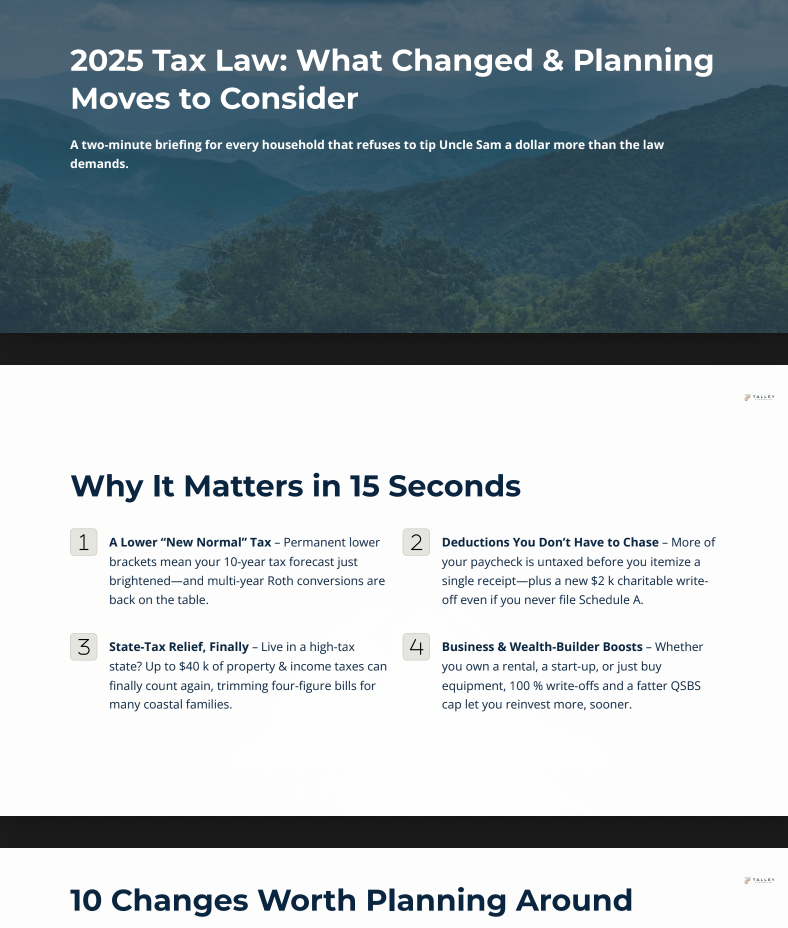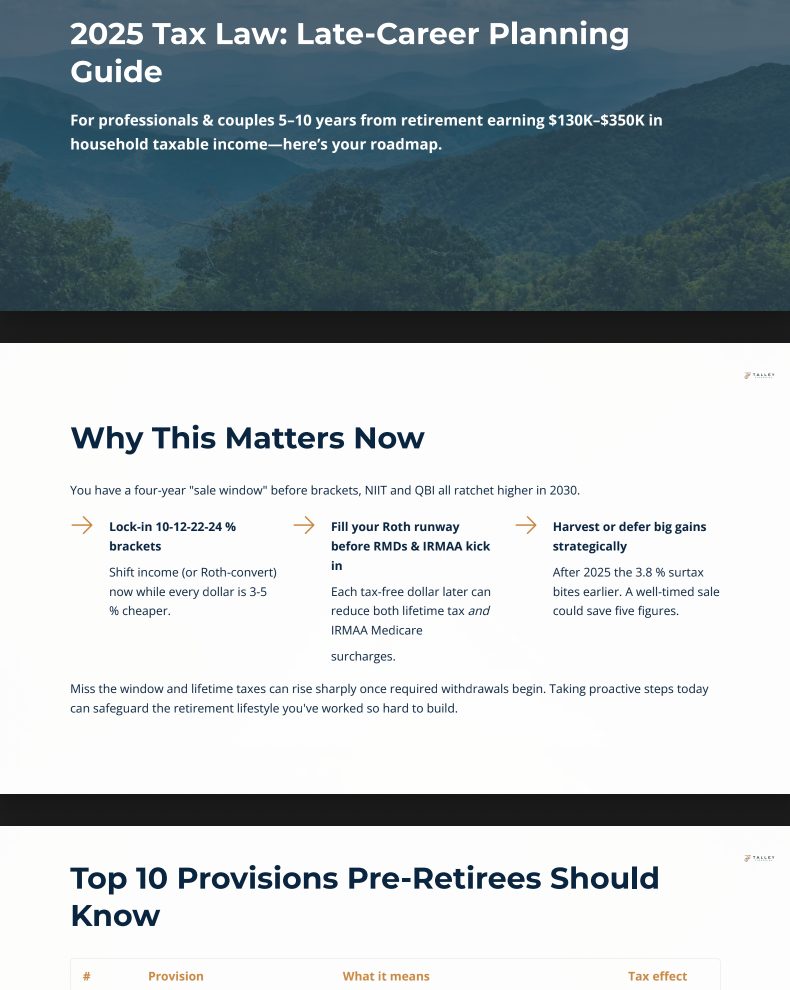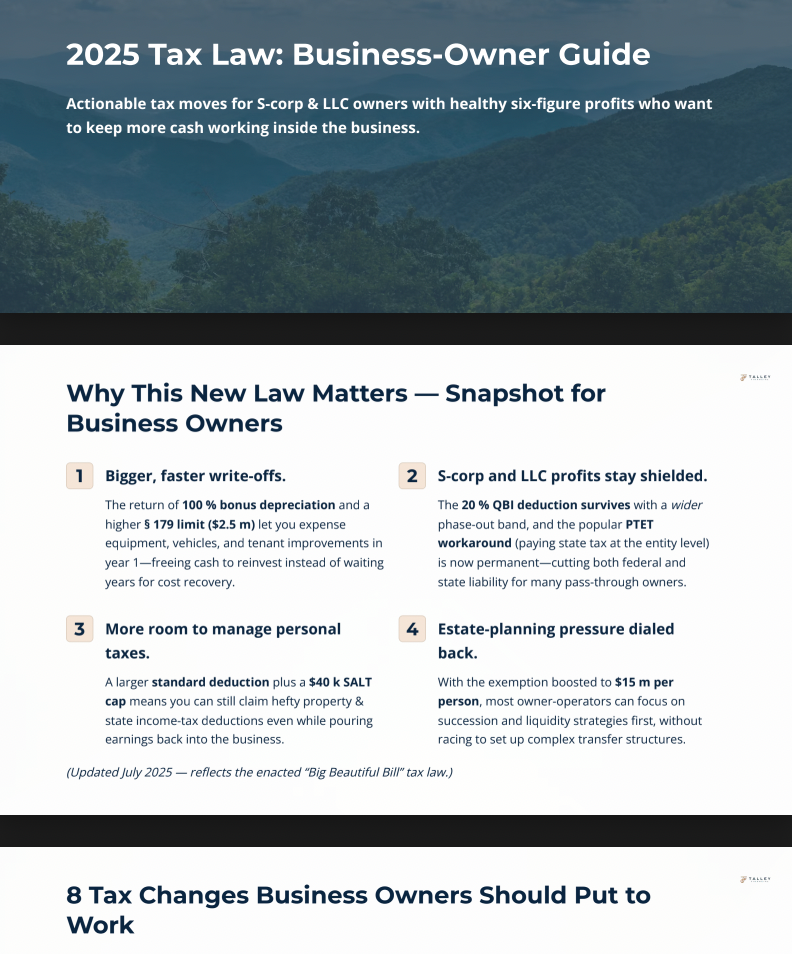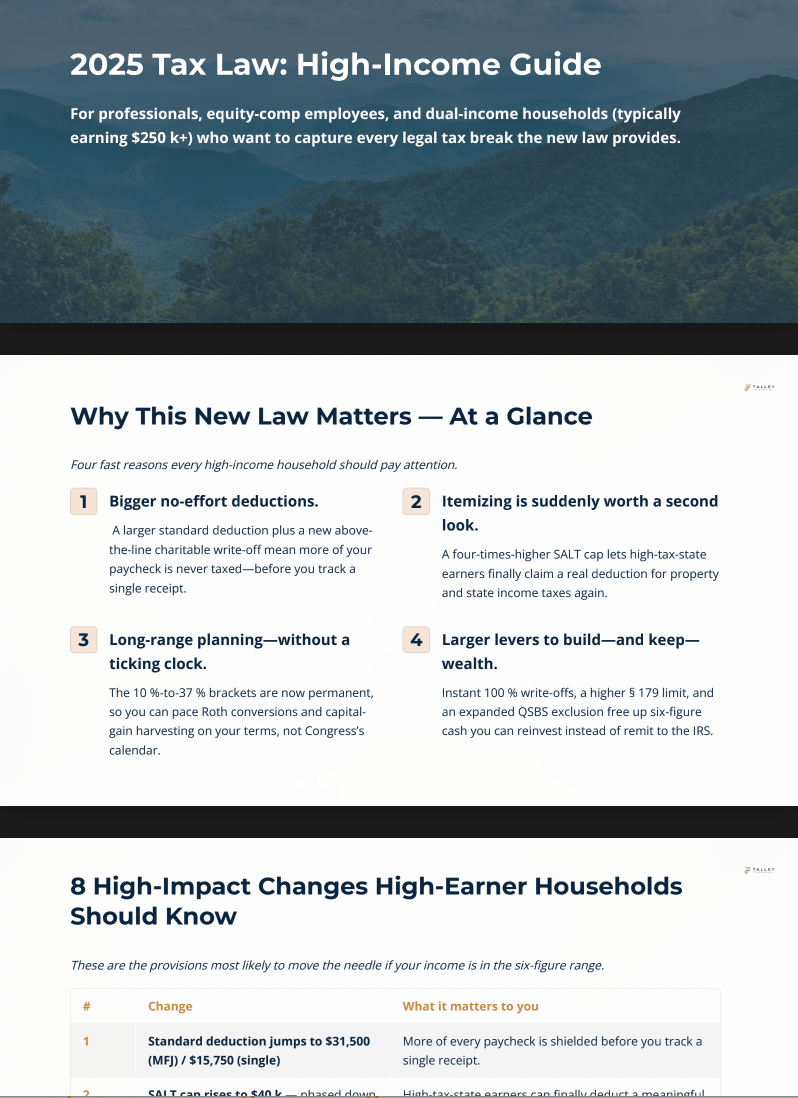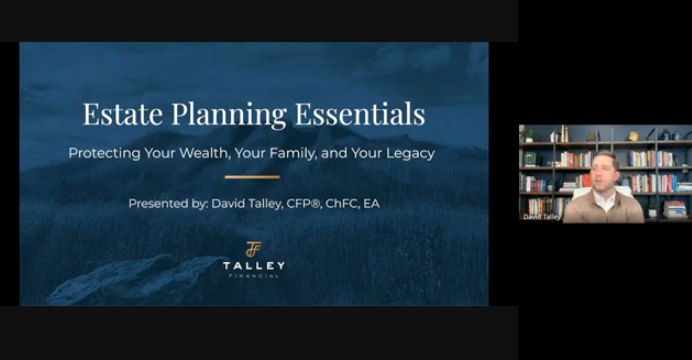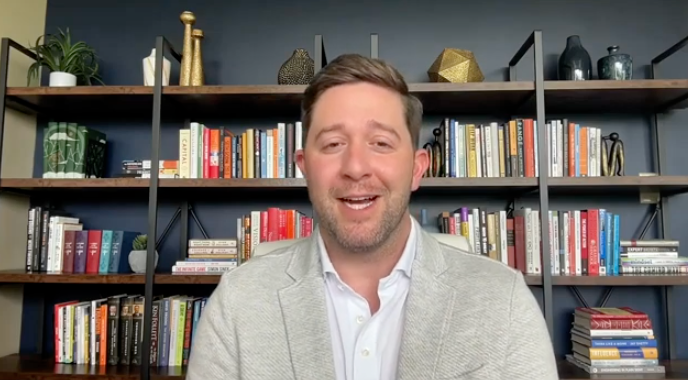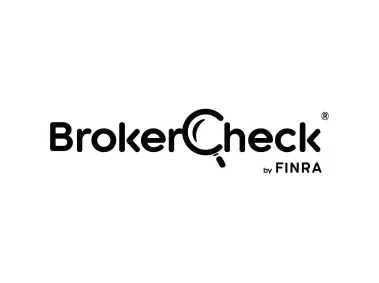Retiring to Johnson City? The 2025 Tax Law Changes You Can't Ignore
You're likely in a unique and exciting phase of life: the retirement countdown has begun. With 5 to 10 years left before you punch out for good, it’s a crucial window for making smart financial moves that will shape your entire retirement journey. And for many, this exciting time includes considering a new place to call home, with Johnson City, Tennessee, becoming a top destination for retirees.
While you might be focused on the golf course, hiking trails, or the vibrant community Johnson City offers, it’s also a time when your financial strategy needs a serious shift. When you're younger, tax planning often revolves around one question: “How do we lower the tax bill that's due next April?” But as you get closer to retirement, that question changes dramatically to: “How do we lower your lifetime tax bill – the cumulative amount of tax you'll pay over your entire retirement?”
This shift is vital because virtually every investment decision you make has a tax component. Unfortunately, many people have two completely separate relationships: one for investment advice and another for tax preparation, and sometimes even tax strategy. This often leaves significant opportunities on the table because, as I like to say, “the left hand doesn't understand the right”. You could be missing out on valuable strategies simply because your financial pieces aren't working together.
Adding another layer of importance to your planning is the “Big Beautiful Bill” tax law, enacted in July 2025. This new legislation brings notable changes that pre‑retirees need to understand.
Why This New Law Matters – In One Glance: Simplicity Amidst Complexity
In my opinion, this new tax bill unfortunately adds a lot more complexity for Americans as a whole. There are now so many “AGI phaseout thresholds” that going just a few dollars over or under a certain income threshold can make an outsized difference in the amount of tax you pay. And since your last few earning years before retirement are often your highest, the numbers at play get larger, meaning the impact of these thresholds can be more significant. Plus, in higher earning years, new taxes can come into play altogether. And once you actually retire, there's a whole new set of rules to learn, from IRMAA surtaxes to Roth conversions and different deductions.
But don't worry, amidst this complexity, there are four key reasons why every household roughly 5–10 years from retirement should pay attention:
- More automatic shelter for withdrawals. Good news here! The standard deduction for a couple leaps to $31,500. This means that every dollar you pull from IRAs or brokerage accounts now crosses a higher tax‑free threshold. Simply put, a larger portion of your withdrawals will be tax‑free before you even have to track a single receipt. This gives you more room to fill low tax brackets with strategies like Roth conversions or capital gains.
- Itemizing may finally beat the standard again. If you live in a high‑tax state (which many people moving to Johnson City might be leaving), the new $40,000 SALT cap allows many families to deduct far more property and state income tax. This can often tip the math back toward itemizing on Schedule A, potentially trimming four‑figure tax bills.
- Roth‑conversion pacing gets easier. The 10% to 37% tax brackets are now permanent. This is fantastic news because it means you can spread Roth conversions and gain‑harvesting ladders across several low‑tax years, rather than feeling like you're racing against a looming deadline. No more sprinting to beat a 2026 sunset!
- Estate tax pushed out of reach for most families. The exemption jumps to $15 million per person (indexed). This significantly reduces the need for complex gifting strategies for most families, allowing you to focus on your income‑stream planning first. Couples can now shield approximately $30 million federally, pushing federal estate tax out of reach for many.
9 Tax Changes Pre‑Retirees Should Have On Their Radar: A Deep Dive
Let's zoom in on the specific changes that matter most to you as you approach retirement. Here's a breakdown of the key shifts and why they're important when you're 5–10 years away from stopping work:
- Standard deduction jumps to $31,500 (MFJ) / $15,750 (single).
Why it matters before you stop working: More of every IRA or brokerage withdrawal is tax‑free before you track a single receipt—use it to fill low brackets with conversions or capital gains. - SALT cap rises to $40,000, phases down once AGI tops $500,000 (MFJ).
Why it matters before you stop working: If you live in a high‑tax state, property and state income taxes may finally push itemizing ahead of the standard deduction again, trimming four‑figure bills. - 10%–37% brackets are now permanent.
Why it matters before you stop working: Roth‑conversion and gain‑harvesting ladders can be spread over several years—no more sprint to beat a 2026 sunset. - Above‑the‑line charitable deduction $2,000 joint / $1,000 single.
Why it matters before you stop working: You can give cash to charity and still claim the larger standard deduction—an automatic write‑off for most households. - Estate & gift exemption increases to $15 million per person (indexed).
Why it matters before you stop working: Couples can shield approximately $30 million, pushing federal estate tax out of reach and letting you focus on income‑stream planning first. - Age‑73 RMD start + softer penalty (10% if fixed in 2 years).
Why it matters before you stop working: Two extra low‑bracket years to “fill” the 12%–24% bands with conversions before mandatory withdrawals begin. - 100% bonus depreciation for rental upgrades.
Why it matters before you stop working: Real‑estate owners can expense rehab costs in year one, wiping out passive income well before RMD age. If you're considering having a property or three once you retire, doing so before retirement may have enormous tax benefits. We saw this play out for Mike and Janet, as you'll see in their story below. - HSA eligibility extended to ACA Bronze & Catastrophic plans (2026).
Why it matters before you stop working: Switching to one of these plans just before retirement opens triple‑tax‑free space for Medicare‑gap health costs. These pre‑tax contributions lower your Modified AGI, which can help you stay under income cliffs that shrink premium‑tax‑credit subsidies. - Car‑loan interest deduction up to $10,000, phases out at $200,000–$250,000 AGI.
Why it matters before you stop working: Financing a 2025–28 vehicle can turn “dead” interest into an above‑the‑line deduction—as long as you keep AGI below the phase‑out ceiling. This deduction is admittedly for people under certain income thresholds. However, for those who qualify, it effectively means they get a discount on the interest rate they'd qualify for if they buy a new, American‑made car. Suddenly, that math is a whole lot more compelling to say, “Hey, I'm going to let my money earn more than that, and the debt hurts me at three [percent].” Versus if you're paying the full interest and you don't get this deduction, then it's a little harder to make that argument.
Success Story: Real‑World Impact with Mike & Janet
Let's look at a concrete example of how these tax laws can be leveraged. Meet Mike and Janet, both age 58.
Their Situation:
- Joint W‑2 income: $280,000
- Traditional IRA: $900,000
- Brokerage: $750,000
- Mountain‑cabin remodel (rental property): $60,000
Mike and Janet are a perfect example of how combining proactive planning with an understanding of these new tax laws can lead to significant savings:
- Step 1: Bracket & SALT Prep.
They ran a two‑year projection and saw that itemizing with the new $40,000 SALT cap would beat the larger standard deduction by $7,000.
Benefit: This set the stage to deduct state income and property taxes they couldn't claim before. - Step 2: Above‑Line Cash Gift.
They gave $2,000 to their church in December.
Benefit: This extra $2,000 deduction stacked on top of their SALT write‑off, without the need for Schedule A hoops. - Step 3: 100% Bonus Depreciation on Remodel.
They placed their $60,000 cabin upgrade in service on December 15, 2025.
Benefit: This allowed a year‑one write‑off that wiped out the last chunk of W‑2 income that would have spilled into the 24% bracket, saving them approximately $14,000 in tax. This demonstrates how bonus depreciation can offset high‑rate W‑2 income in the same year, not over 27.5 years. - Step 4: Max Final HSA while still on employer plan.
They contributed $8,300 (with catch‑up) before retiring mid‑2026.
Benefit: This opened triple‑tax‑free space they'll use for Medicare‑gap costs later. - Step 5: Q1 2026 Withholding Tune‑up.
They filed a fresh W‑4 based on new deductions and set cash reserves for the gap year before Social Security.
Benefit: This ensured smooth cash flow and no April surprise.
Why this worked: The $40,000 SALT cap plus itemizing recovered deductions they'd lost since 2018. Bonus depreciation offset high‑rate W‑2 income in the same year, not over 27.5 years. And using the above‑line $2,000 charity deduction meant no loss if itemizing ever flips back to the standard deduction.
Illustrative only. Actual savings will vary with IRS tables and personal circumstances. This case study is hypothetical and may not represent other clients’ experiences. Not individualized tax, legal, or investment advice.
Frequently Asked Questions: Clearing the Air
- How big a Roth conversion can I make each year without tripping IRMAA or the NIIT?
First, add the conversion amount to your projected AGI and check two lines: IRMAA tiers (for 2025 Part B premiums, the key breakpoints are approximately $194k and $246k for Married Filing Jointly). Also, consider the NIIT surtax at $250k MFJ / $200k single. The goal is to keep the combined income just below the next tier to avoid higher Medicare premiums and the 3.8% surtax. - Itemizing vs. the bigger standard deduction—what's my break‑even with the new $40k SALT cap?
Add your property tax, state income tax (capped at $40k), mortgage interest, and charitable contributions. If the total exceeds $31,500 (the 2025 standard deduction for couples), itemizing wins; otherwise, stick with the standard deduction. - Can the new $2k above‑line charitable deduction stack with Qualified Charitable Distributions (QCDs) once I hit 73?
Yes. QCDs reduce AGI first, and then you can still claim up to $2,000 joint / $1,000 single for cash gifts above the line. Both write‑offs can live on the same return. - We'll retire on ACA coverage for a few years—how do the 2026 Bronze‑plan HSA rules interact with premium subsidies?
Starting in 2026, Bronze and Catastrophic plans qualify as HDHPs, allowing you to fund an HSA. Those pre‑tax contributions lower your Modified AGI, which can help you stay under the income cliffs that shrink premium‑tax‑credit subsidies. - The estate exemption is now $15m per person—can I shelve my SLAT or ILIT plans?
Couples can now shield about $30 million federally, so many families can pause new complex trusts. However, keep existing documents in force (they still work!) and be ready to act if Congress ever lets the exemption fall again. - If we remodel our rental this year, can 100% bonus depreciation offset our W‑2 income?
Bonus depreciation first offsets income inside the rental activity. It can only touch W‑2 wages if you materially participate (e.g., 500 hours/year or 100 hours and more than anyone else) so the rental counts as non‑passive. - Do I still need a back‑door Roth once I lose 401(k) access?
The back‑door strategy survived intact. It's still worth doing if most of your existing IRA balance is already Roth (or zero) so the pro‑rata rule doesn't dilute the conversion.
Your First Moves For The Next 90 Days: Taking Action
Feeling clearer about these changes? Here are some immediate, proactive steps you can take in the next three months:
- Map your 2025 tax head‑room. Run a two‑year projection to spot bracket space and see if itemizing beats the larger standard deduction under the $40,000 SALT cap.
- Size this year's Roth‑or‑gain move. Test‑drive how much you can convert—or harvest in capital gains—while today's 22%–24% brackets are still wide open.
- Check your Medicare & IRMAA outlook. Remember: 2025 AGI sets 2027 premiums. Keep conversions or bonuses below the next IRMAA tier if cash flow is tight.
- Lock in write‑offs before December 31st. Place rental upgrades or business equipment in service to capture 100% bonus depreciation or the higher §179 limit.
- Update withholding & estimates early. The bigger standard deduction and new deductions change what you'll owe—tweak your W‑4 or Q4 voucher now, not next April.
Retiring to Johnson City, TN? What to Consider
It's no secret Johnson City, TN, is becoming a top retirement destination! Many pre‑retirees are drawn to its charm, affordability, and natural beauty. However, the exciting prospect of living in a new location often comes with a new set of financial adjustments. It's not that the tax planning itself is unique here, but rather that you need a plan from someone who understands the flexibility needs that come with retiring to a new place. This includes navigating a different cost of living, adjusting to new hobbies now that you're retired, and planning for different travel goals.
City of Johnson City · Cost of Living — Johnson City · Retirement Planning (Talley)
Ready for Tailored Tax & Financial Planning?
You don't have to understand every intricate detail of these tax changes right now. My primary goal for clients is to help them feel
Clarity: clarity about what their money is doing, and clarity about what they want, and can, do with their life as a result. We're so comprehensive, and so patient with your understanding, that we'll take the time to get it right. While there are certain tax deadlines, the reality is that with proactive tax planning, you can get things to a point where you're comfortable and confident about what you're doing, even if you don't fully understand everything at the outset.
Learn how we help retirement planners.
Talley Wealth · 203 Broyles Dr. Suite 301, Johnson City TN 37601 · (423) 617‑0160 · mytalleyfinancial.com
Securities offered through Registered Representatives of Cambridge Investment Research, Inc., a broker‑dealer member FINRA/SIPC. Advisory services through Cambridge Investment Research Advisors, Inc., a Registered Investment Adviser. Cambridge and Talley Financial are not affiliated. Cambridge does not offer tax or legal advice but Talley Tax Solutions does.
Illustrative only. Not individualized tax, legal, or investment advice.



